Did you know that in addition to being able to reduce people’s council tax, local councils can provide other benefits? These include care and care facilities for ill and disabled people or loans and grants to help people to study. Read on to find out more.


- Reductions in council tax are available if you are on a low income or unemployed.
- Local authorities can often help people to cover travel costs with free bus passes.
- Payday loans for people on benefits should be avoided as they’re expensive
In this chapter, we will explain what financial assistance is available from local authorities We will cover Council Tax Reduction, disability grants, help with travel and school uniforms and Social Services support. We will also look at what help is available to both young and adult learners, who wish to continue or finish their education, but are struggling to do so due to a low income.
Local councils also provide Housing Benefit for people struggling to pay for their housing. Instead of discussing Housing Benefit in this chapter, we have dedicated the whole of chapter 10 to explaining how it works and how Universal Credit is replacing it.
Note: The guidelines that we give here are often generalisations. The help that is available from local councils varies widely. You might find that your local authority is slightly or entirely different. One good thing to do is find out who your local council is on the gov.uk website and see what they can offer.
Support from your Local Council
- Council Tax Reduction
- Social Services support for vulnerable adults and those recovering from illness
- Disabled Facilities Grants
- Other Support from local councils
- Support And Financial Aid For Education, including:
- Learner Support
- The 16 to 19 Bursary Fund
- The Residential Support Scheme and the Residential Bursary Fund
- Grants & Bursaries For Adult Learners
When you apply for a national benefit like Jobseeker’s Allowance, you know that the rules of eligibility are the same for everyone in the country and you will receive the same amount as everyone else. Unfortunately, this doesn’t apply to benefits from local authorities. Benefits that you receive from your local council, such as Council Tax Reduction, can vary widely from one place to another.
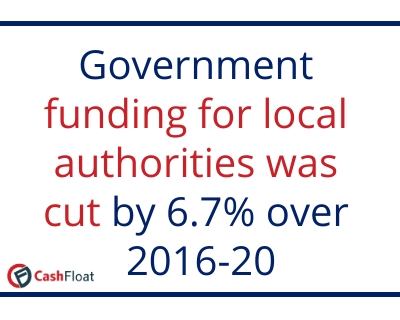

With the central government cutting funding for local authorities, local councils’ budget largely depends on how much they can raise from Council Tax and business rates. This means that if you live in an affluent area, your local authority will have more money to allocate to Social Services and Council Tax Benefits. For less affluent areas, the opposite is true; they cannot spend the money if they do not have it. Unfortunately, this often means that areas with more low-income families, who rely on short-term emergency loans to get through the month, actually have less money available for Council Tax Reduction.
Council Tax Reduction
- Council Tax Reduction replaced Council Tax Benefit in April 2013.
- Reductions in council tax are available to people who pay council tax and are on a low income and/or receiving state benefits.
- The amount of Council Tax Reduction you can receive depends on your location, income, savings, circumstances and size of household.
- You apply directly to your council for a reduction and may have to provide information about your earnings and any savings you have.
- In Northern Ireland, Council Tax Reduction is not available. Instead, there are schemes to help people pay their rates.
You can receive a reduction in your Council Tax if you are on a low income and/or receiving benefits. It does not matter whether you are a homeowner or a tenant.
Whether you are eligible for Council Tax Reduction will normally depend on:
- Where you live. Each council has its own scheme.
- Your household income, including earnings, benefits and savings.
- The number of children you have living with you.
- Any disabilities you or someone in your household has.
- If any other adults live in your home.
- Your residency status in the UK.

How to Claim Council Tax Reduction
To claim Local Council Benefits, such as Council Tax Reduction, you will have to deal directly with your local council.
For Council Tax Reduction, you will need to provide evidence of you and your partner’s income and savings and any other relevant information. Your local authority will usually decide within 14 days of your application and notify you of the outcome in writing. If they refuse to make a reduction or if they do not reduce your council tax as much as you believe they should, you can ask them to reconsider their decision.
The Default Council Tax Reduction Scheme
Many local councils use the default Council Tax Reduction Scheme, which was set up by the government. Under this scheme, the government sets an ‘applicable amount’, which is the minimum amount that your household needs to live. This amount varies according to your circumstances. When you apply for Council Tax Reduction, if your income is less than the applicable amount, you will automatically get the maximum Council Tax Reduction. If your income is more than the applicable amount, then you may still get a reduction, but it will decrease according to how high your income is.
Should I Apply and How Much Will I Get?
It is best to look at the rules for eligibility on your local council’s website to see whether you could be eligible in your area. You may also be able to find out how much you can expect to receive. To find out who your local council is, use the government’s local council finder, available here. Follow the link to your local council’s website.
Social Services from Local Councils
Local authorities will pay for some, or all, the support you need from social services if you are classed as a vulnerable adult.
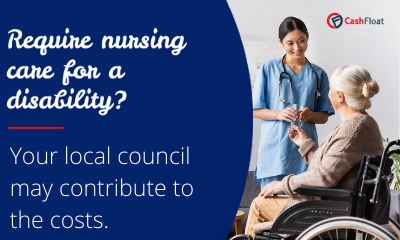
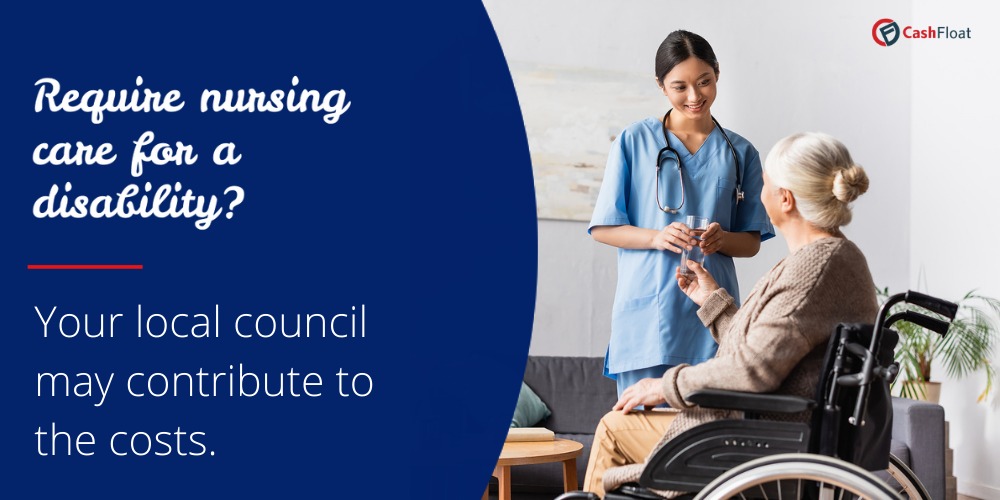
Social services provide a wide range of support to vulnerable adults. This includes people who need specialist equipment and home adaptations because of an illness or disability, nursing care or specialist care after they have left the hospital. If you need equipment and you have not yet received your grant, you can apply for an online loan to cover the cost. You should first ensure that the council are likely to accept your request for help, so that you will have the money to make your repayments promptly.
Community equipment (anything to make your life easier, such as phones with large buttons), minor home adaptations and ‘reablement’ (if you need care after a recent illness or disability) are often provided free of charge. Allowances of up to £1,000 can be paid for each home adaptation or piece of equipment you need because of an illness or disability.
Means-Testing for Council Social Support
For many social services, your local council will carry out a financial assessment to see if you should contribute to or pay the full cost of your care. Known as ‘means-testing’, this assessment will consider your earnings, pension, benefits, savings and any property that you own. The aim of it is to see how much you can contribute to the cost of your own care.
Different councils carry out their own assessments. Generally speaking, if you have savings of less than £23,250, the council will contribute to the cost of your care. Your home will not be included in the assessment unless you are moving into a care home and your partner will not continue to live in your home. However, if you have savings in a bank account, stocks or shares, or own any other property, this will be taken into consideration. While income does not count as savings, if you have an income (including benefits or a pension), this may affect what you receive.
Disabled Facilities Grants
- Disabled Facilities Grants are available from local authorities to adapt properties (owned or rented) to meet the needs of a disabled person.
- To be eligible for a Disabled Facilities Grant, you will normally be means-tested. The means-test will take into consideration your income, savings and capital. Depending on the results of this, you may be required to pay for some of the cost yourself.
- Grants are available in England, Wales and Northern Ireland and the maximum amount varies from £25,000 in Northern Ireland to £36,000 in Wales. Other support is available in Scotland.
- On top of being means-tested you will need to meet certain eligibility criteria and, before any work takes place, you will need to be assessed to see if the adaptation is both necessary and practical.
Disabled Facilities Grants are available to help cover the costs of adapting a property to meet the needs of a disabled person. You can receive it whether you are a property owner or a tenant. To apply, you should contact your local authority directly.
Like many other social services provided by the council, Disabled Facilities Grants are means-tested. The amount that someone can receive depends on their income and any savings they have over £6,000.
How much will I Receive as a Disabled Facilities Grant? | |
|---|---|
| England | Max. £30,000 |
| Northern Ireland | Max. £25,000 |
| Wales | Max. £36,000 |
After your application, the local council needs to carry out an assessment. So, make sure not to start any work until they approve the grant. According to the ‘Housing Grants, Construction & Regeneration Act 1996’, providing a Disabled Facilities Grant to someone who meets the requirements is mandatory. However, the wording of the legislation says the adaptation must be ‘necessary and appropriate’ for the needs of the disabled person. It also must be ‘reasonable and practical’ for the property. This means that your local authority could turn down a grant if they think they have reason to do so.
What if I Live in Rented Accommodation?
If you do not own your own home, you can still get a Disabled Facilities Grant and improve your home to meet the needs of your disability. If this is the case, ask your landlord for permission to apply for a Disabled Facilities Grant before doing so. Your landlord cannot refuse to give you permission without having a good reason to do so. If they would, they would be committing disability discrimination, which is illegal.
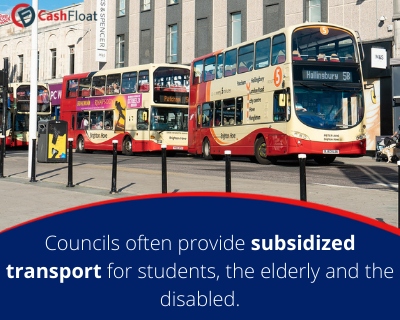
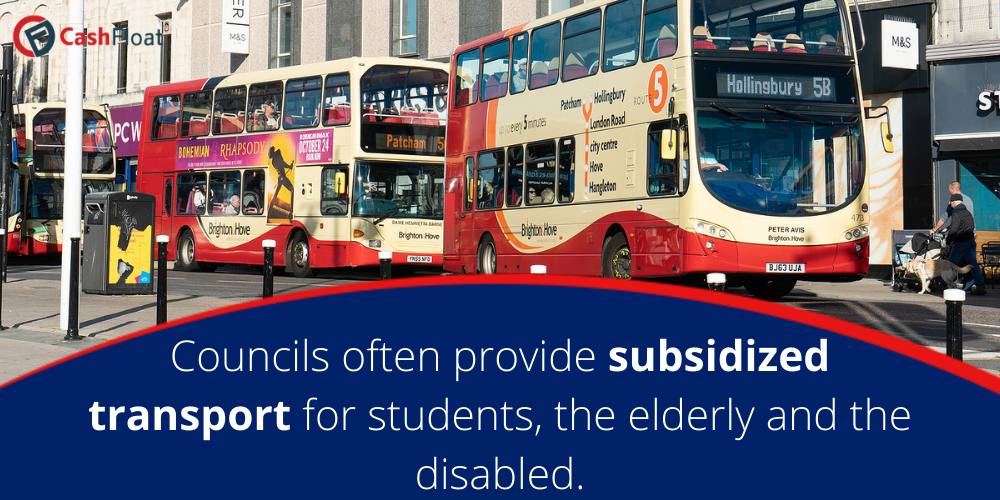
Other Help from Local Authorities
There are other benefits that you might be entitled to from your local council. The support that councils provide varies from one council to another. The best thing to do is to visit your local council’s website and see what they can do. Go to the government’s local council finder and follow the link to your local council’s website.
Additional help that you may be able to get includes subsidised transport on local buses for 16-19-year-olds in secondary education, help with the cost of providing a school uniform and P.E kit, and welfare assistance through voucher schemes for food, furniture and household appliances. Often there are bus passes for the elderly and the disabled, that allow them to travel free or at a discount using locally run bus services.
FAQs about Council Tax Reduction and Other Benefits from Local Councils
How much of a discount can I get off my Council Tax?
Depending on your circumstances and your local council’s rules, you can receive a discount of up to 100%. People who live on their own are automatically entitled to a 25% reduction in their council tax bill, and people who are on a low income will receive a discount according to the rules set out by their local council.
What happens if my local council refuses to change their decision about my eligibility for Council Tax Benefits?
If they do not reconsider after you have queried their decision, your next step is to appeal to the Valuation Tribunal.
How long do council social services provide reablement support after hospitalisation?
Reablement is provided free of charge for up to six weeks. After this time, you may have to pay for it.
How does the council means-test a Disabled Facilities Grant for a child?
There is no means-test if work is to be carried out using a Disabled Facilities Grant for a child under 18. Neither any income that the child may receive or their parent’s income will be taken into account.
How long does it take after the application for a Disabled Facilities Grant for the assessment to take place?
The local authority will assess within a maximum of six months of receiving your application, and the work should be completed within 12 months. Normally applications are quicker than this, although the average time between making an application and completing work is currently 34 weeks.
Support and Financial Aid for Education
- There is financial help available if you wish to do a course in further education to escape unemployment and dependence on state benefits.
- There is also help for people who are doing training courses, such as City and Guilds NVQ courses
- Learner Support is available for students over 19 who are studying at Colleges of Further Education. Learner Support can be used to pay for accommodation, travel and course materials. For people over the age of 20, it can be used to cover the cost of childcare.
- For people aged 16-19, help is available to cover the general costs of study through the 16-19 Bursary Fund. People aged 16-19 can also get help to cover the costs of accommodation associated with study, if they are eligible.
- Adult learners can often find support for training and academic education, through grants and bursaries.
One of the solutions to youth unemployment is the provision of vocational training. This allows young people to work and learn a trade at the same time, often as apprentices. Recently many schemes have been introduced to encourage students away from academic learning and towards vocational training. Nowadays, more GCSE finishers opt for vocational training than they do to study A-levels. For these people, help is available, as we explain below.
But what about students doing a course at a local college of further education? Traditionally, academic education is the best way to improve your chances on the job market and escape from poverty and reliance on state benefits. Unlike students doing a university degree, students doing a further education course are not eligible for student finance through loans. Luckily, help is available for this too.


Learner Support
If you are 19 or over and on a Further Education course, you might be eligible for Learner Support. Funded by the Skills Funding Agency, Learner Support could pay for accommodation, travel and/or materials and equipment needed for your course. You can apply for it even if you are getting other professional or career development loans.
To receive Learner Support, you should apply directly to your learning provider. It is also worth asking the student support staff at your place of study, and the National Careers Service, if you might be eligible for other funding. If you are unhappy with the decision taken by your learning provider about your application for Learner Support, there is an appeals procedure.
What Can Learner Support Be Used For? | |
|---|---|
| If you are over the age of 19 and don’t have any children | You can apply for Learner Support if you need help to cover the costs of accommodation, travel and course materials and equipment. |
| If you are a parent and over 20 | On top of providing support for the costs mentioned above, it can also be used to help with childcare costs |
| If you are a parent and under 20 | You cannot receive childcare support and will need to apply to the ‘Care To Learn’ scheme instead. Through this, you can receive up to £175 per week for childcare. |
There is no set amount to be given out for Learner Support. Your learning provider (i.e. your college) will decide how much you will get. The amount will depend on your circumstances and their particular scheme. You will either receive the payment as a direct payment to you, which you don’t need to pay back, or as a loan. Alternatively, it can be paid to someone else to cover costs that you would normally pay yourself (such as to your landlord).
How do I Apply to the Care to Learn Scheme?The Care to Learn scheme is run by the government rather than by places of further education or local councils. To see if you may be eligible and to apply go to the government website here.
The 16 to 19 Bursary Fund
- This bursary fund provides financial support to 16-19 year olds studying a publicly-funded course of further education or are on an unpaid training course.
- There are two types of 16-19 bursaries. They are discretionary bursaries and vulnerable student bursaries. They both have different eligibility rules.
- You apply through your learning provider and you can receive up to £1,200 depending on your circumstances and if you receive any benefits.
- The money can be used to pay for your expenses (like clothing and course equipment) or for travel.
You are eligible for the 16-19 Bursary Fund if you are:
- Between 16 and 19 on 31st August on the year that you apply.
- Attending a publicly-funded school or college (i.e. without fees) in England or on an unpaid training course.
- Eligible according to certain other requirements.
The bursary can be used to pay for clothes, books, course equipment and transport/lunch on the days you study or train.
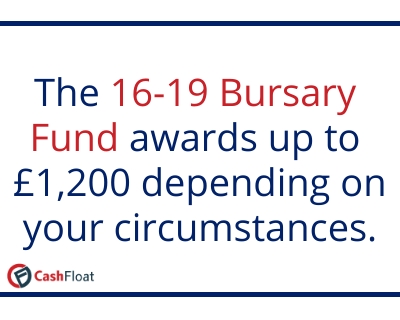

The two types of 16-19 bursary: The Discretionary Bursary and the Vulnerable Student Bursary.
The Discretionary Bursary
The discretionary bursary is awarded if you need financial help but do not qualify for the vulnerable student bursary. Your learning provider will decide how much you can receive, according to what expenses you need to cover.
Depending on your needs and your learning provider’s scheme, the council will either pay you money in instalments or as one-off payments. Alternatively, they will give you free access to things like travel, meals or course equipment through vouchers, bus passes or other provisions. If you receive money, it could be cash, a cheque or bank transfer. Some providers make a one-off payment for students and learners who need help to cover the cost of study trips or travel to university interviews.
The Vulnerable Student Bursary
You might be eligible for the vulnerable student bursary if you are classed as a vulnerable student and you are on a full-time course and have expenses that you are not able to cover.
Through this scheme, you may receive a bursary of up to £1,200. However, you will probably receive less than the full amount, or possibly no bursary, if your course is shorter than 30 weeks, you are studying part-time, or don’t have many expenses to cover (for example, you are living with your parents).
You should apply for a vulnerable student bursary via your school, college or training provider. It is best to do it as soon as you register for a course. Ask your tutor or Student Services about how to apply. You might be asked to provide information, such as about any benefits that you receive, to support your application. If your course lasts longer than a year, you should check whether you have to reapply every year or whether the bursary will renew automatically.
NOTE: To be classed as a vulnerable student, you must be at least one of the following:
- In, or recently left, local authority care.
- Receiving Income Support or Universal Credit because you are supporting yourself financially.
- Getting Disability Living Allowance and either Employment and Support Allowance or Universal Credit.
- Receiving Personal Independence Payment and either Employment and Support Allowance or Universal Credit.
The Residential Support Scheme and the Residential Bursary Fund
People between 16 and 19 may be able to get help to cover the cost of accomodation if they are studying a further education course far from their home. The amount you can receive depends on your household income and you will normally need to already be receiving support from the 16-19 Bursary Fund to be eligible.
The Residential Bursary Fund is normally available to students who study at specialist residential centres, while the Residential Support Scheme exists to help students who do not study at specialist residential centres, but live too far to travel each day.
The Residential Bursary Fund
People between 16 and 19 who already receive funding under the 16-19 Bursary Fund may receive The Residential Bursary Fund is available to . They must be studying a full-time course of further education at a college with a specialist residential centre, which is too far to travel to and from each day. To apply you should contact the student support officer at your college. Payments can be provided for a maximum of 3 years.
The Residential Support Scheme
The Residential Support Scheme is available to people between 16 and 19 who already receive funding under the 16-19 Bursary Fund. They must be studying a full time course of further education at a college in England, which is not at a specialist residential centre. The course must either be at least 15 miles or a 2 hour round trip from your home, you should not receive Housing Benefit, and your household income should be less than £30,993. As with the Residential Bursary Fund, payments can be made for up to 3 years. Contact your student support officer to apply.
Grants & Bursaries for Adult Learners
Despite your honest desire to complete or continue your education so that you can compete on the job market and successfully support yourself, as a mature student you might find it difficult to get by without assistance.
Adult learners will be able to apply for a student loan if they are studying a qualifying course at a place of higher education. Normally, this only covers those studying for a degree at university. So what do adult learners do if they want to study a training course or an academic course at a place of further education, such as A-Levels? For these people, help is available through Advanced Learner Loans and, sometimes, through grants and bursaries.
Advanced Learner Loans are not provided by local councils and are provided by the national government instead. If you are over the age of 19 and are studying a level 3, 4, 5 or 6 qualification at an approved college or training provider in England, you may be eligible. The amount that you can receive depends on the course you are studying and any fees that you have to pay. For those studying A-Levels, loans are given for each subject they study and for each part of their A-Level course.
Adult learners studying training courses or academic courses at places of further education may be able to receive support through grants and bursaries. Funding often tends to be provided for specific courses. This commonly includes courses run by City & Guilds, courses at Dance and Drama institutions, courses in medicine, dentistry and healthcare, courses in social work and courses in teaching. The aid available and the application rules vary considerably from one organisation to another. The best thing is to go directly to the grant or bursary provider for information about eligibility and how to apply. Often you do not have to pay these awards back. This can be a huge relief when you are starting a new career and have other financial commitments, such as a family.
FAQs about Education Support from Local Councils
Who isn’t eligible for Learner Support?
You are not eligible for Learner Support if you are receiving student finance (such as a loan for a degree course) or if you are attending a Community Learning course.
Are bursaries for students aged 16-19 only available in England?
Support for 16-19 year olds is available in the rest of the UK, but not under the 16-19 Bursary Fund. The 16-19 Bursary Fund was introduced in England to replace Education Maintenance Allowance. . If you live in Scotland, Wales or Northern Ireland, you should apply for this instead.
In what circumstances can a bursary be stopped?
The council may stop paying your bursary payments if you break the rules. This could be if your attendance record is poor or if you misuse the funds by not spending them on what they were provided to cover.
As an adult learner, how can I find out what grants or bursaries are available?
The gov.uk website provides useful information about grants and bursaries for adult learners and the Family Action website also has a useful grant search tool. Don’t forget to look at Advanced Learner Loans and Student Finance.
Summary: Council Tax Reduction and Local Council Support
In this article, we discussed many of the benefits provided by local councils. We covered support for ill and disabled people, Council Tax Reduction and financial help for people in education. Hopefully, you now have a clearer idea of what support you can access from your local council.
Previously, one of the most common benefits provided by local councils was Housing Benefit. While many people still receive it, it is gradually being replaced by Universal Credit. We will discuss this issue in the next chapter.


